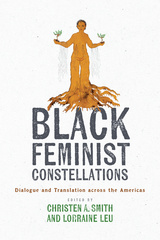
Channeling Knowledges
Water and Afro-Diasporic Spirits in Latinx and Caribbean Worlds
2024 Honorable Mention, Isis Duarte Book Prize, Haiti/ Dominican Republic section, Latin American Studies Association
How water enables Caribbean and Latinx writers to reconnect to their pasts, presents, and futures.
Water is often tasked with upholding division through the imposition of geopolitical borders. We see this in the construction of the Rio Grande/Río Bravo on the US-Mexico border, as well as in how the Caribbean Sea and the Pacific Ocean are used to delineate the limits of US territory. In stark contrast to this divisive view, Afro-diasporic religions conceive of water as a place of connection; it is where spiritual entities and ancestors reside, and where knowledge awaits.
Departing from the premise that water encourages confluence through the sustainment of contradiction, Channeling Knowledges fathoms water’s depth and breadth in the work of Latinx and Caribbean creators such as Mayra Santos-Febres, Rita Indiana, Gloria Evangelina Anzaldúa, and the Border of Lights collective. Combining methodologies from literary studies, anthropology, history, and religious studies, Rebeca L. Hey-Colón’s interdisciplinary study traces how Latinx and Caribbean cultural production draws on systems of Afro-diasporic worship—Haitian Vodou, La 21 División (Dominican Vodou), and Santería/Regla de Ocha—to channel the power of water, both salty and sweet, in sustaining connections between past, present, and not-yet-imagined futures.
Hey-Colón’s approach to water is expansive and groundbreaking, as the book engages with saltwaters and freshwaters, unsettling the disciplinary boundaries that have traditionally linked these bodies of water to either Caribbean or Latinx Studies . . . As such, Channeling Knowledges, which is part of the 'Latinx: The Future Is Now' series run by the University of Texas Press, represents a crucial and timely contribution to Afrolatinx, Caribbean, Border, and Religious Studies.
Channeling Knowledges successfully explores Afro-diasporic spirituality in literary worlds that pull us into Olokun’s depths, while it elevates the intellectual, artistic, and activist labor of Latina/x and Caribbean writers.
Hey-Colón posits an intriguing, thought-provoking approach to reading Latinx and Caribbean diasporic literature...She demonstrates an impressive command of Afro-diasporic religions and has used it well to offer innovative and penetrating readings of iconic texts and paintings.
Channeling Knowledges is a significant contribution to Black diaspora studies, Caribbean studies, and US Latinx studies. Its interdisciplinary nature marks its value for scholars working with water as a literary trope or those working with traditional knowledge systems.
[This book] puts forth promising pathways for understanding Afro-diasporic, Latinx, and Caribbean knowledges, and the urgency to transcend limiting ways of understanding/being.
Hey-Colón beautifully lays out the multilayered spiritual significance of water in the work of Afro-diasporic and/or Latinx artists, drawing on highly complex Afro-diasporic/Caribbean belief systems. This superb book is a pleasure to read.
Through a deep and careful study of Afro-syncretic ritual practices, Puerto Rican poetics, Dominican literary fiction, Chicana archives, and Haitian and Dominican remembrance practices, Hey-Colón ushers us into the expansive possibilities of water as sanctuary, techno-resonance, and regeneration. A moving contribution to the study of Latina texts and spiritual practices, Channeling Knowledges offers a necessary entryway into a set of systems, practices, and imaginations that unsettle facile understandings of Afro-diasporic worldviews in contemporary Caribbean and Latinx cultural and social productions and, in so doing, reveal critical aspects of our entwined futures.
A fascinating work. Hey-Colón makes a significant contribution through her centering of Afro-diasporic knowledges and encourages readers to think more broadly about who and what is signaled under the umbrella of Latinidad. Hey-Colón’s expertise comes through with poise and confidence.
Rebeca L. Hey-Colón is an assistant professor in the Department of Spanish and Portuguese at Temple University.
- Acknowledgements
- Prologue. Infusing the Sacred: The Liquid Knowledges of the Afro-Diasporic World
- Chapter 1. Channeling the Undocumented in Mayra Santos-Febres’s boat people
- Chapter 2. The Techno-Resonances of Rita Indiana’s La mucama de Omicunlé
- Chapter 3. Afro-Diasporic Currents in the Gloria Evangelina Anzaldúa Papers
- Chapter 4. Orishas in the Borderlands
- Epilogue. Water and Light: The Bóveda as Counter-Archive
- Notes
- Works Cited
- Index


















